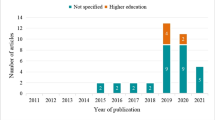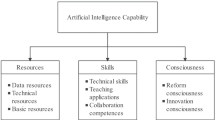Abstract
Understanding student’s thinking ability, strengths, weaknesses, learning behaviour, and their learning capacity are essential considerations in the virtual learning environment (VLE). The major aim of this research study is to design a ‘Student Model’ on the basis of the individual’s ‘bio-psychological potential’. In this work, the student’s cognitive and personality traits are identified through psychometric inventories such as Benziger thinking style assessment (BTSA) for brain dominance analysis, Kolb’s learning style inventory (LSI) for identifying the style of learning, Howard Gardner’s MI inventory for multiple intelligence identification and Paul Costa R. Robert McCrae’s Big Five personality identification. The proposed model using a fuzzy soft set-based hybrid optimization algorithm for reducing the parameters. The fuzzy softest phase follows fuzzification in which the linguistic variables are formed from the crisp input and generate fuzzy sets further fuzzy soft sets are formed from the formulated fuzzy sets. Finally, the hybrid fuzzy particle swarm-grey wolf optimizer (HFPSGWO) algorithm to accomplish parameter reduction and determine the indispensable parameters and final phase perform student rank analysis. The performance results reveal that the hybrid fuzzy GWO (FGWO) and fuzzy PSO (FPSO)are outperformed when analysing different performances such as fitness function, selection of features, accuracy, and computational time.








Similar content being viewed by others
References
Al-Qudah Y, Hassan N (2018) Complex multi-fuzzy soft set: its entropy and similarity measure. IEEE Access 6:65002–65017
Asopa P, Asopa S, Mathur I and Joshi N (2019) A model of fuzzy intelligent tutoring system. In: InInternational conference on innovative computing and communications, pp 303–311
Çağman N, Enginoğlu S (2010) Soft matrix theory and its decision making. Comput Math Appl 59(10):3308–3314
Danjuma S, Herawan T, Ismail MA, Chiroma H, Abubakar AI, Zeki AM (2017a) A review on soft set-based parameter reduction and decision making. IEEE Access 5:4671–4689
Danjuma S, Ismail MA, Herawan T (2017b) An alternative approach to normal parameter reduction algorithm for soft set theory. IEEE Access 5:4732–4746
Demir İ, Özbakır O (2018) An extension of Lowen’s uniformity to the fuzzy soft sets. Konuralp J Math 6(2):321–331
Khameneh AZ, Kılıçman A (2018) Parameter reduction of fuzzy soft sets: an adjustable approach based on the three-way decision. Int J Fuzzy Syst 20(3):928–942
Kong Z, Jia W, Zhang G, Wang L (2015) Normal parameter reduction in soft set based on particle swarm optimization algorithm. Appl Math Model 39(16):4808–4820
Kong Z, Ai J, Wang L, Li P, Ma L, Lu F (2019) New normal parameter reduction method in fuzzy soft set theory. IEEE Access 7:2986–2998
Li Z, Xie N, Wen G (2015) Soft coverings and their parameter reductions. Appl Soft Comput 31:48–60
Liu Y, Liu X (2018) Fuzzy soft set multi-attribute decision making method based on TOPSIS with improved entropy weight. In: 2018 International conference on network, communication, computer engineering (NCCE 2018). Atlantis Press
Ma X, Qin H (2019) Soft set based parameter value reduction for decision making application. IEEE Access
Ma X, Sulaiman N, Qin H, Herawan T, Zain JM (2011) A new efficient normal parameter reduction algorithm of soft sets. Comput Math Appl 62(2):588–598
Ma X, Liu Q, Zhan J (2017) A survey of decision making methods based on certain hybrid soft set models. Artif Intell Rev 47(4):507–530
Malik N, Shabir M (2019) Rough fuzzy bipolar soft sets and application in decision-making problems. Soft Comput 23(5):1603–1614
Ostrander A, Bonner D, Walton J, Slavina A, Ouverson K, Kohl A, Gilbert S, Dorneich M, Sinatra A, Winer E (2019) Evaluation of an intelligent team tutoring system for a collaborative two-person problem: surveillance. Comput Hum Behav
Qin H, Ma X (2019) Data analysis approaches of interval-valued fuzzy soft sets under incomplete information. IEEE Access 7:3561–3571
Qin H, Noor AS, Ma X, Chiroma H, Herawan T (2017) An adjustable reduction approach of interval-valued intuitionistic fuzzy soft sets for decision making. Appl Math Inf Sci 11:999–1009
Tiwari AK, Shreevastava S, Som T, Shukla KK (2018) Tolerance-based intuitionistic fuzzy-rough set approach for attribute reduction. Expert Syst Appl 101:205–212
Xu Z, Wijekumar K, Ramirez G, Hu X, Irey R (2019) The effectiveness of intelligent tutoring systems on K‐12 students' reading comprehension: a meta‐analysis. Br J Educ Technol
Funding
No funding is provided for the preparation of manuscript.
Author information
Authors and Affiliations
Corresponding author
Ethics declarations
Conflict of interest
The authors declare that they have no conflict of interest.
Ethical approval
This article does not contain any studies with human participants or animals performed by any of the authors.
Additional information
Publisher's Note
Springer Nature remains neutral with regard to jurisdictional claims in published maps and institutional affiliations.
Rights and permissions
About this article
Cite this article
Chandrasekhar, U., Khare, N. An intelligent tutoring system for new student model using fuzzy soft set-based hybrid optimization algorithm. Soft Comput 25, 14979–14992 (2021). https://doi.org/10.1007/s00500-021-06396-8
Accepted:
Published:
Issue Date:
DOI: https://doi.org/10.1007/s00500-021-06396-8




